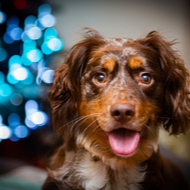Warning over rise to dangers to dogs in December

Around 40 per cent of dog owners noticed a change in their dog's mood during the festive season as a result of new smells, sights and sounds.
A staggering 75 per cent of dogs were more likely to be treated for food poisoning in December compared to any other month in 2020, according to new research.
Figures released by The Kennel Club in partnership with Agria Pet Insurance also reveal that December has been the highest month for intoxication claims consistently since 2015.
The findings come as further research by The Kennel Club found that 40 per cent of dog owners notice a change in their dog’s mood during the Christmas period caused by new smells, sights, and sounds.
As such, the Organisation is urging pet owners to be careful of 'canine Christmas dangers' and is sharing some important advice to help them navigate the festive season.
Bill Lambert, health, welfare and breeder services executive at The Kennel Club, said: “For humans, Christmas is one of the most wonderful times of the year, but for our dogs, it can be a very unusual and strange period. Not only are there plenty more people to meet, as well unfamiliar sights and sounds, but there are also a lot of tempting treats, which can be very dangerous for our canine companions.
“Of course, as part of the family, we all want to involve our dogs in the celebrations, but we need to ensure that all of the nation’s dogs can enjoy a stress-free and safe Christmas, particularly as it will be the first festive season for so many dogs and their owners.”
Additional research by Kennel Club also found some 23 per cent of owners reported unusual behaviour from their dog during the festive season, such as destroying decorations or presents and eating food from the dinner table.
Around 18 per cent of owners admit that their dog’s routine is disrupted over Christmas, either through not being walked as much or getting less play or attention.
Further advice for pet owners on how to create ‘a carefree canine Christmas’ can be found on the Kennel Club website.



 The Veterinary Medicines Directorate (VMD) is inviting applications from veterinary students to attend a one-week extramural studies (EMS) placement in July 2026.
The Veterinary Medicines Directorate (VMD) is inviting applications from veterinary students to attend a one-week extramural studies (EMS) placement in July 2026.